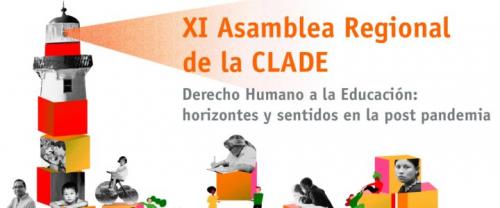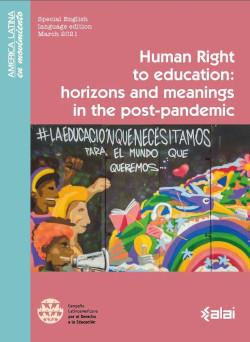Final Declaration of the XI CLADE Regional Assembly
- Declaración

| Article published in ALAI’s magazine No. 551: Human Right to education: horizons and meanings in the post-pandemic 05/03/2021 |
After a reflection process carried out through seven thematic virtual meetings and the subsequent systematization of the contents that emerged, in order to evaluate and ponder them in intense work days developed through assemblies also virtually during this last week, CLADE (Latin American Campaign for the Right to Education) has issued its final document that – in some way – constitutes the roadmap for the next two years. Here is the full text:
Letter in Quarantine
Final Declaration of the XI CLADE Regional Assembly
November, 2020
The XI Assembly of the Latin American Campaign for the Right to Education (CLADE), held virtually between October 13 and November 26, was attended by more than 100 people from member organizations of CLADE, student and teacher representatives, movements, civil society organizations, researchers and academics, in a context where in our Latin America and Caribbean and throughout the world, we are living the consequences of the pandemic caused by Covid-19. This health crisis has serious impacts on the economic, educational, environmental, political, and life and nature care sectors, highlighting even more the weak public policies on health, education, and employment, among the most important ones.
The pandemic impacts the various populations differently, increasing the historical structural inequalities of our region, a legacy of colonization, patriarchy, and neoliberal policies. It generates new inequalities that once again impact historically excluded populations such as women, the impoverished population in urban and rural areas, indigenous, Andean and Amazonian peoples, the Afro-descendant population, people with disabilities, migrants and refugees, peasants, the LGBTIQ+ population, early childhood, children in child labor, youth and the elderly. On the other hand, it can also mean an opportunity for us to react and find alternatives to this depleted model of life and consumption, which is essentially unjust and deeply destructive.
Historical disparities and inequities in the exercise of the human right to education increased and deepened during this period. The consequences for all actors in the educational communities, from early childhood and throughout all educational pathways, the violations of this right have multiplied and deepened. Additionally, teachers, especially women, have seen their labor rights violated and the privatization tendencies of education have deepened, further threatening public, free, secular education for all.
We knew a new model of privatization (families, students and teachers assuming the cost of equipment and connection), student stratification (based on the possibilities or not of connection) and hundreds of thousands of students unable to continue their educational process in these contexts. This situation threatens to continue and expand with the announcement of hybrid teaching models.
The Latin American Campaign for the Right to Education, its national forums, regional networks and international NGOs that are part of it have made a great effort since the beginning of the present crisis, to accompany processes that guarantee the rights of the people, to reflect on the consequences of the pandemic, to denounce the deepening of inequality and to encourage the commitment of the educational community not to give up in front of the difficult situation that was worsening.
In this context, from our XI Regional Assembly,
WE AFFIRM
That the right to education is a central obligation of nation states. This demand must be updated in a context of the arrival of virtual media, digital content and the siege of presential schools.
That from CLADE we assume as our duty the elaboration of proposals to guarantee that States comply in these circumstances with their responsibility to accelerate scientific-technological innovation.
That political democracy must have a full educational correlation. Open educational democracy is a challenge for teachers, families and students in the third decade of the 21st century, in harmony with human beings and nature. Democracy for encounter, social justice, intercultural dialogue, care for life and for the constitution of creative and critical subjects.
That a de-colonial education is indispensable in order to dismantle the system of domination in which we live, and to build our own educational projects inspired by the legacy of Paulo Freire.
That the pandemic demonstrated the importance of presence in education and in lifelong learning, because learning is a relational act, which requires dialogue, embracing and acting in the territories and that, when virtuality is indispensable, it must also guarantee the human right to education, with all that this means.
WE EXHORT
That States assume their role as guarantors of human rights, considering the indivisibility of these rights and education as an enabling factor for the exercise of other rights. That they reduce inequalities and make our societies more just and egalitarian.
To meet international commitments by accelerating the development of policies that seek to achieve the goals of the Education Agenda 2030 and the Agenda 2030 for Sustainable Development.
That they issue intersectoral and inter-sectional policies to advance towards inclusion, equity and quality, considering the multiple dimensions of diversity (gender, religion, ethnicity, culture, language, disability, geographic location, socioeconomic status, sexual orientation, among others), which are sources of discrimination. Anti-discriminatory education that leads to the emancipation of individuals, their peoples, and movements is imperative.
That they guarantee universal and public access to the internet as a right, and not as a commodity. Developing our own open virtual platforms, which guarantee our sovereignty in educational technology.
That they ensure teacher training based on a rights-based approach and updated in terms of advances in science and technology, knowledge and respect for nature as a source of life, nourishment, and care for planet Earth, our common home.
To guarantee strategic planning for the construction of knowledge about the right to education and care in early childhood, and to recognize the importance of the diverse experiences of civil society.
That they value the proposals of girls, boys, young people, and adolescents in the formulation of policies and norms that protect their right to education, health, integral protection, and participation.
That they recognize the importance of community education that responds with territorial pertinence to their needs, shares knowledge, and strengthens the bonds of solidarity among the diverse institutions that operate in their environment, including educational institutions.
That they guarantee the necessary financing to ensure a public, sufficient and relevant education from early childhood and for life, and that with this goal they put in place mechanisms of tax justice and not of debt.
WE PROPOSE
That the centrality is retaken and public services are strengthened not only in education, but also in health, social protection, housing, among others, with a view to avoiding the aggravation of inequalities. It is urgent and necessary that the different social movements articulate themselves in order to collectively fight for the achievement of all rights.
That intersectoral policies be adopted with emphasis on:
Political and citizen education for all actors in the educational communities.
Education in Human Rights.
Education with a gender perspective.
Education focused on life and the rights of our “Mother Earth”.
Popular education and critical pedagogies.
Education based on territoriality.
Education for the care and attention of early childhood
Youth and Adult Education.
For the reopening of schools, which should be progressive and decided in a participatory manner, the States should commit to strengthening school feeding policies as a strategy to guarantee food and nutritional security for children, adolescents and their families.
WE REAFFIRM
Our irrevocable commitment to strengthening democracies and the permanent participation of civil society in decision-making in public affairs, which must include women, children, young people and students, and groups that have historically been discriminated against on the basis of gender, ethnicity, age, language, sexual orientation and disability, among others.
Our commitment to decolonization, de-patriarchy and, in general, to the strengthening of humanist and emancipatory visions of education, which include the promotion of peaceful coexistence in all educational communities, the deconstruction of machista patterns, the promotion of collective learning environments, popular education and the opening of schools to their communities.
Our commitment to on-site, technologically updated educational spaces, reaffirming our willingness to work to demand fair budgets, equipment and technological infrastructure to sustain these meeting spaces under equal conditions.
Our commitment to the youth, their demands, their struggles and their organizational processes, in defense of all their rights.
Our commitment to building networks and articulating social movements in the promotion and defense of the Human Right to Education.
For an emancipatory, updated and rights-guaranteeing education!
November 26 2020
Del mismo autor
- A social pact for education 17/03/2021
- Un pacto social por la educación 05/02/2021
- Final Declaration of the XI CLADE Regional Assembly 27/11/2020
- Declaración final de la XI Asamblea de CLADE 27/11/2020
- Frente a la renovada amenaza mercantilista contra el Derecho Humano a la Educación 13/11/2020
- Desigualdades e interseccionalidades: Si no es inclusiva y transformadora, no merece llamarse Educación 06/11/2020
- La Educación de Personas Jóvenes y Adultas en América Latina y el Caribe 29/10/2020
- Organización Mundial para la Educación Preescolar: Dignidad para todos los niños y las niñas del mundo a través del Derecho a la Educación 26/10/2020
- ¡Alto al TiSA!: Tratado de libre comercio pone en riesgo la garantía de los derechos humanos 22/07/2016
- Histórica resolución de la ONU insta a los Estados a regular proveedores de educación y respaldar la educación pública 13/07/2016

